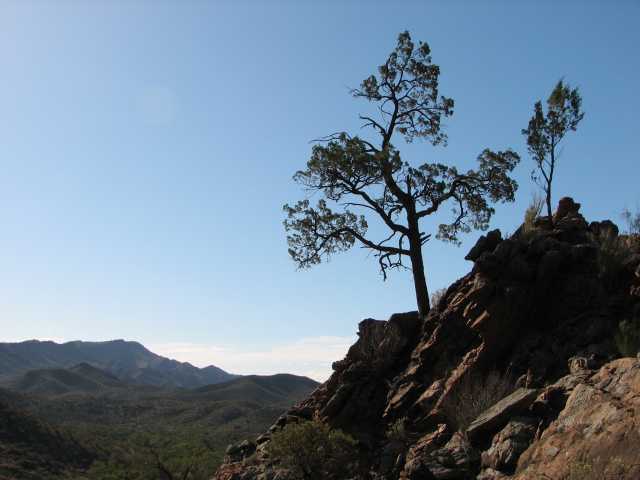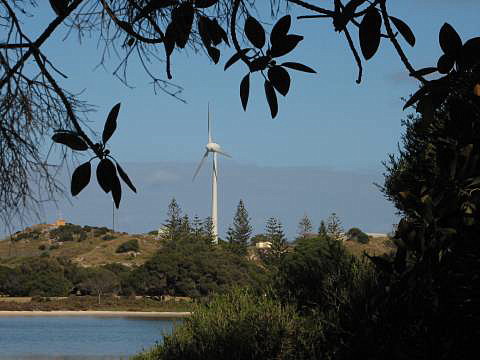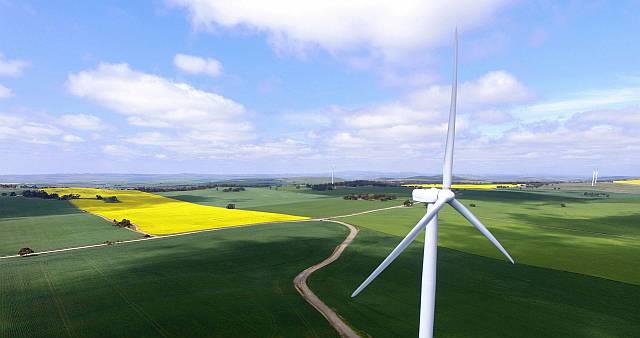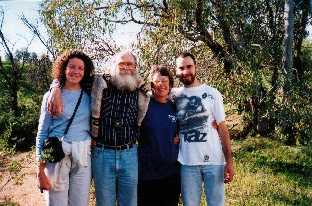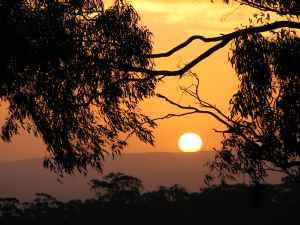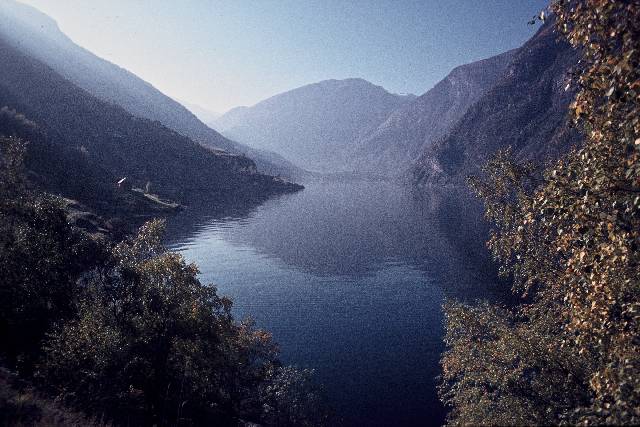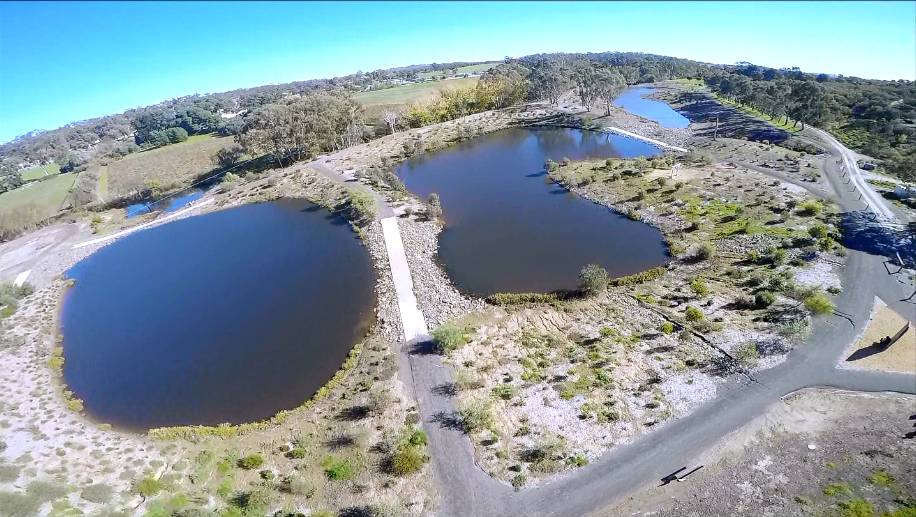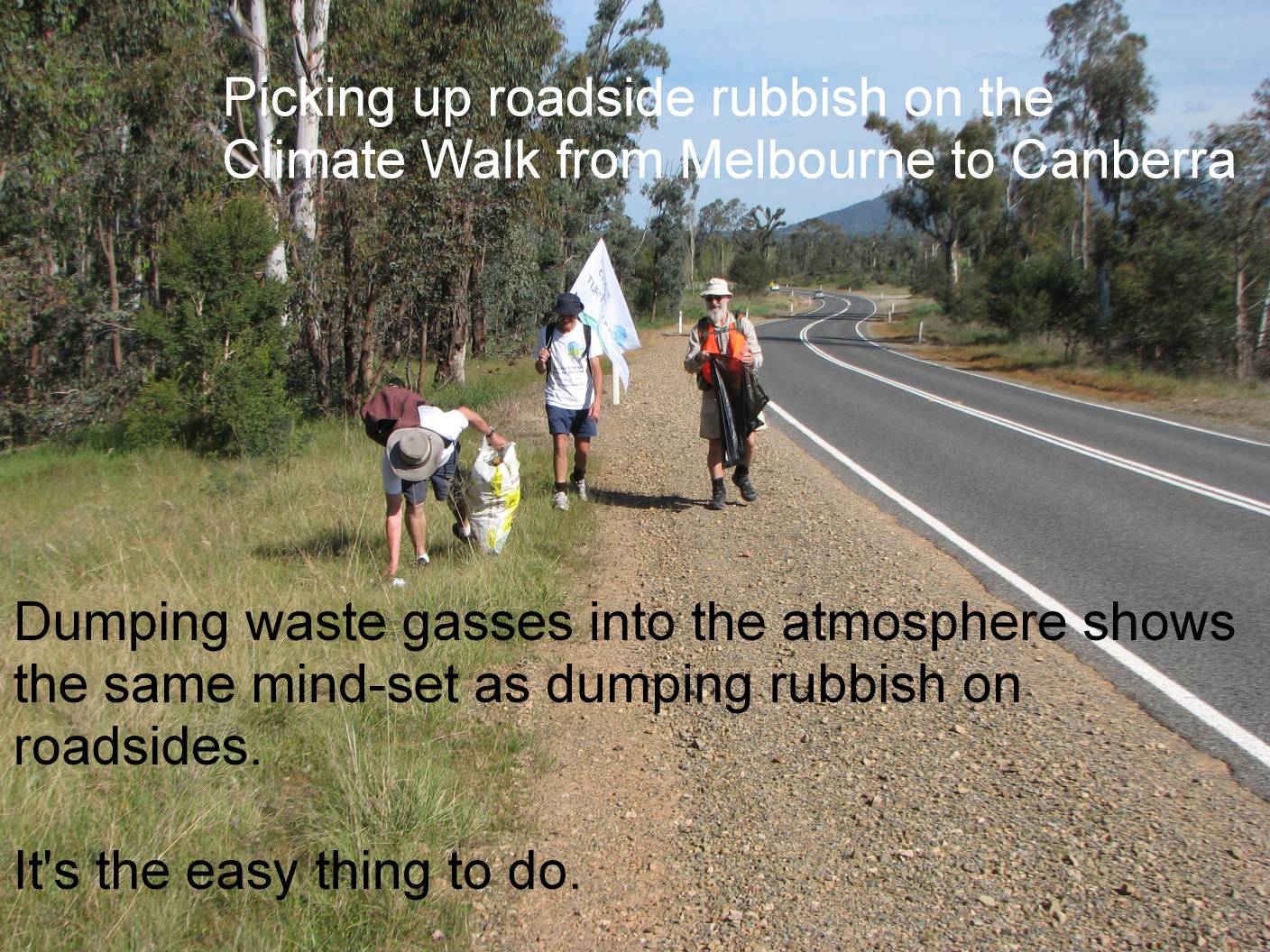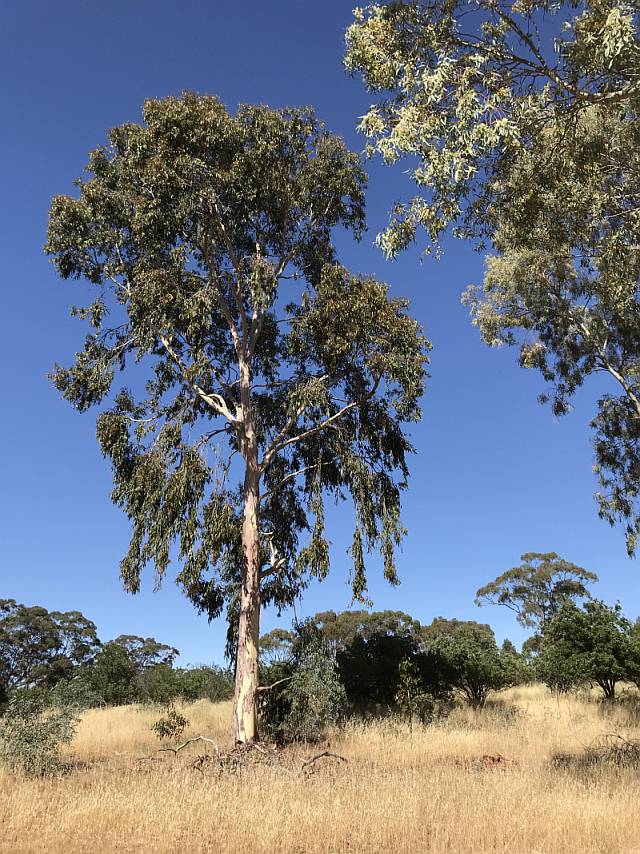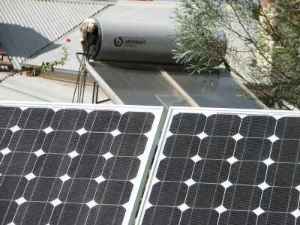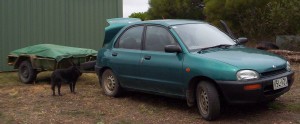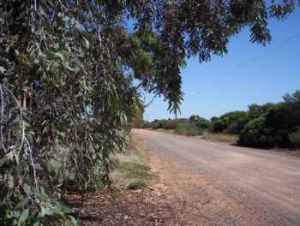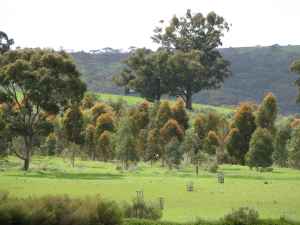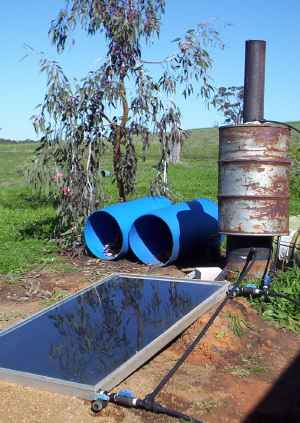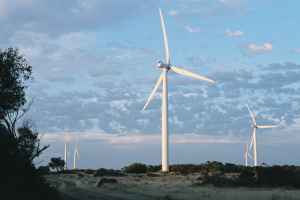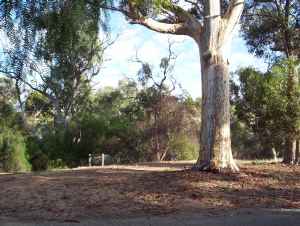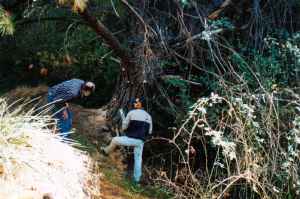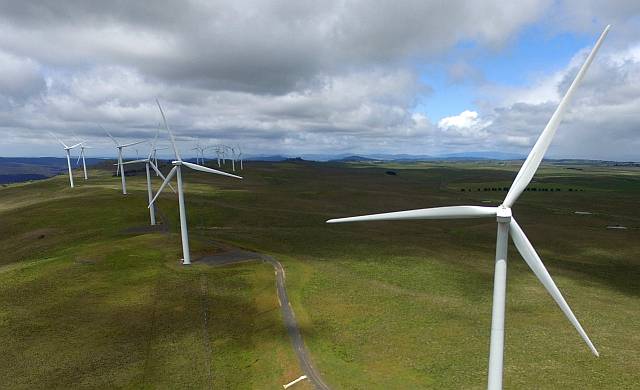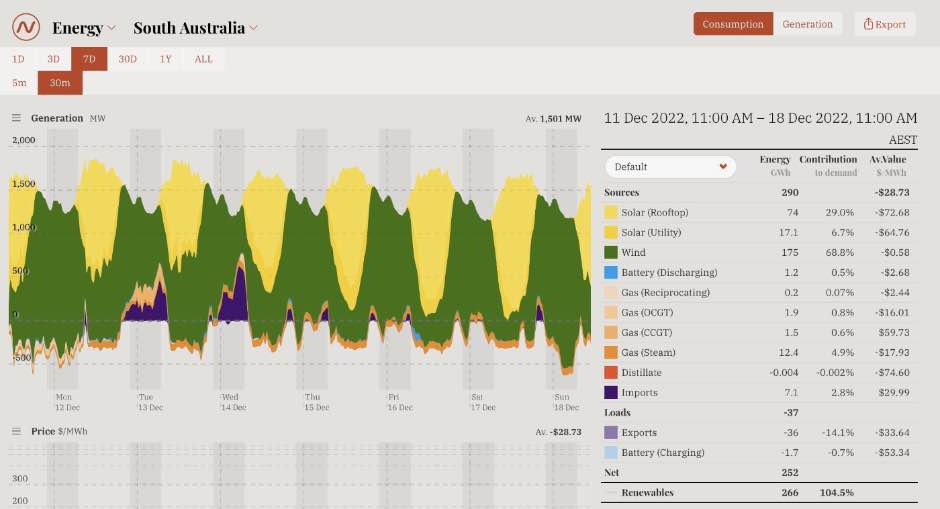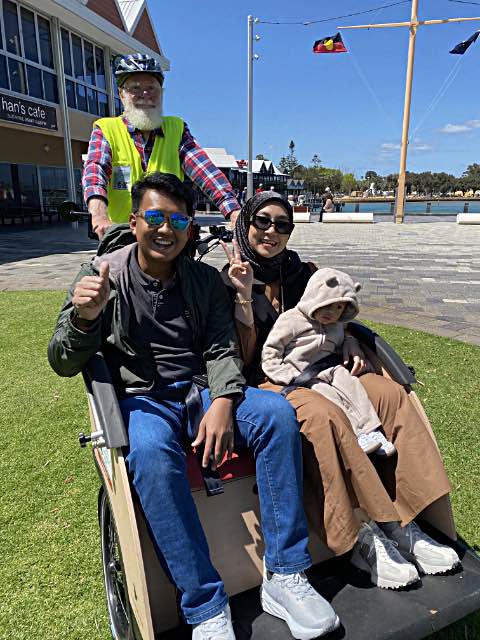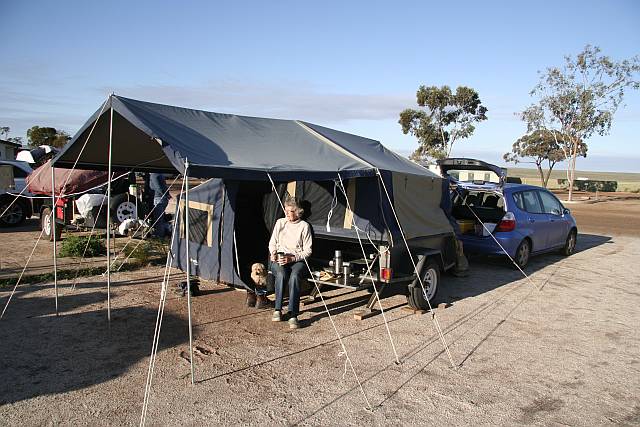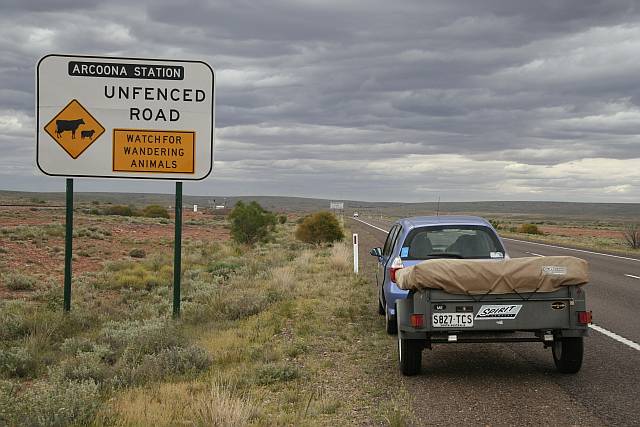|
As I write these pages I am not beholden to any political party, any lobby group or any corporation. I do not seek financial support from any advertiser or anyone else. I write as a 'free spirit' on whatever subject takes my interest. Of course I try to write only facts or opinions that can be supported by sound evidence.
What is precious to me?My family;Truth; The natural world, our planet Earth; The advance of science and the fight against ignorance and delusion (including religion and other superstitions); Philosophy – including especially moral philosophy (ethics); The arts; Friends; Freedom. |
We must all (certainly including myself) continually examine ourselves and our beliefs, searching for possible delusions.
The natural world, our living environment and the non-living part of the biosphere that supports life, must be protected if the lives of all of us, and our decedents, are not to be greatly degraded. This of course includes the atmosphere and oceans (climate change, ocean warming, ocean acidification and sea level rise). A related problem is the air pollution from the burning of fossil fuels that kills millions of people world-wide each year.
The natural world is more under threat today than ever before; at a time when altruism toward nature is required, people seem to be just as selfish and short-sited as ever; will they ever realise that without our environment we have nothing? I have decided to do all I can in the remainder of my life to try to get serious action on climate change; I believe that having compassion for all life demands this.
|
Philosophy teaches us to evaluate arguments and to critically look at all beliefs and opinions. Moral philosophy, ethics, informs us of how we should live. Philosophy places everything, including science and truth, into context.
|
|
- Music: I could list hundreds of pieces here – in no particular order –
- Tchaikovsky Piano Concerto No. 1;
- Borodin Nocturne from String Quartet No. 2 in D Major;
- Dvorak Part six of his Stabat Mater; Tenore solo, Coro. Andante con moto (Fac me vere tecum flere);
- Geroges Bizet Au fond du temple saint (In the Depths of the Temple);
- Sibelius Finlandia;
- Pachelbel Canon;
- Rachmaninoff piano concerto No. 2;
- J. S. Bach air on a string of G;
- Handel Messiah; Ombra mai fu;
- Grieg The Four Seasons; The Morning from Peer Gynt;
- Jeffes Music for a found Harmonium;
- Vaughan Williams The Lark Ascending;
- Ennio Morricone & Chiara Ferrau Nella Fantasia;
- And how could I miss Beethoven, particularly for his ninth symphony.
- Painting: A very rough selection of a few of my favourite painters, again in no particular order –
- Hans Heysen (Australian; particularly known for his paintings of gum trees and the Flinders Ranges);
- Rembrandt;
- J. M. W. Turner;
- John Constable;
- H. J. Johnstone (I am in love with a single work of his: "Evening Shadows – Backwaters of the Murray" in the Art Gallery of South Australia)
- The Heidelberg School; particularly:
- Tom Roberts;
- Frederick McCubbin;
- Arthur Streeton;
Islam's antipathy to the arts is one reason I loathe and fear that religion.
Friends; I don't have a lot. I haven't met many people who think like me. Those I have are precious. A Walk for Solar Power in 2012 and the Climate Walk, two years later, significantly increased the number of people I know who think like me, and, I would like to think, the number of my friends.
Freedom; The freedom to do whatever one wants to do, within ethical limits: freedom of speech, freedom of thought, freedom of belief, freedom of the media (under threat as I write in Australia and elsewhere), the freedom of whistle-blowers to report wrong-doing, freedom to pursue knowledge; freedom from institutionalised misinformation as exists in places like China, North Korea and increasingly in the USA and Australia; freedom from discrimination; the freedom to die if, when and how we want to.
Freedom cannot exist under a theocratic government as in Iran and some other countries and states under the yoke of the Islamic delusion. Freedom did not exist in Europe while Christianity dominated thought there.
What is loathsome to me?
- Anti-science
- Lies
- Delusion, self-deception and superstition
- Ignorance
- Greed
- Corrupt government
|
Lies from people who cannot support their arguments with valid and rational evidence, or who simply don't bother trying to discover the truth. I hold that those in a position of power who lie (rather than make false statements through ignorance) in order to support the fossil fuel industry or to hold back climate change action are among the greatest criminals in history. (It is interesting that opposition to wind power is often based on fallacies and selfishness while opposition to coal is based on concern for our shared environment.)
Delusion and superstition; the beliefs held without supporting evidence; including minor delusions such as divination and that great delusion, religion. (Of course there are many very good people who are deluded; but they are good in spite of their delusions rather than because of them.) There is little difference between self deception and delusion.
Ignorance allows the anti-science forces and the liars to get away with their activities. "Not to know is bad; not to wish to know is worse." African proverb
Greed; the greed of those who can never have enough money (and the power that comes with wealth) is doing great harm to the world. Society should condemn such people, instead there seems to be a twisted form of hero-worship. Governments should be working toward redistributing the wealth that is in so few hands; instead they seem content to allow the rich to become richer and the poor to become poorer. (I've written pages on corporate greed and contribution to society.)
|
|
Why do I write these pages?
Since about 1985 I've been writing letters to the editors of local, state, and Australian national newspapers because I felt an obligation to at least try to dispel lies, delusions and self-deception, and to make the world a better place.
|
- "The only thing necessary for the triumph of evil is for good men to do nothing."
- Edmund Burke
- "I aimed to make the Earth a better place – and failed miserably"
- Professor Harry Messell (However, the world was a better place for his having lived.)
In 2002 I wrote a page on 'The Real USA' because the pandering to the US by Australian governments, both Labor and Liberal, sickened me. I wanted to show that much of what various US administrations had been up to was far from honourable. This was for a few years one of the most visited of my pages. With the election of Donald Trump the USA has certainly deteriorated further than its position in 2002. In 2020 Australian governments continue their shameful pandering to the USA.
Early in 2004 I started writing my pages on wind power. (I had followed the development of wind and solar power with interest since before the construction of Australia's first wind farm at Esperance in 1987.) The aim of those particular pages was to give the facts, and make an effort to dispel the myths, about wind power. I am convinced that the greatest single threat facing the world in the early twenty-first century is climate change and one thing we can do to greatly slow climate change is to replace fossil fuel electricity generation with renewable energy as quickly as possible. In terms of achievement, I suspect that spreading the facts about wind power is the best thing I've ever done.
| ||||
|
Many of those who are opposed to wind power also deny climate science because they see that climate change demands moving away from fossil fuels to renewable energy. To oppose wind power is to support the coal industry by default; air pollution from the mining, transport and particularly the burning of coal kills millions of people world wide each year.
People like Andrew Bolt, Alan Jones and Ian Plimer who make a very lucrative (although hardly a respectable) living out of opposing action on climate change, probably don't believe much of what they write and say; they are simply cynically working for the fossil fuel industry and pandering to the ignorant. I believe that it is necessary to show that much of what they claim is false by giving the evidence behind the truth.
On 'the same side' as Jones, Bolt and Plimer (perhaps the employers of Jones, Bolt and Plimer, in a sense) are Gina Rinehart, Clive Palmer and Gautam Adani, who are probably only interested in the money that they can make out of anything at all, it just happens that they have chosen coal; they are motivated by greed, they simply don't care about the future of the planet. Similarly, Rupert Murdoch has done enormous damage to the world by his purveying of lies about climate change, fossil fuels and renewable energy.
A paraphrasing of Mark 8:36 is appropriate here:
"For what does it profit a man to gain the whole world if it means forfeiting his self respect and earning the contempt of decent people."
Then there are the well meaning, but deluded people, like (ex Dr) Sarah Laurie, who believe most of what they say, but do a great deal of harm. Their claims need to be debunked.
Finally there are the many who are best characterised as ignorant, ill-informed and/or selfish and those who are simply undecided but open-minded. I have no expectation of changing the ways of the Bolts and Joneses of this world, I write in the hope of getting through to at least a few of those whose minds are not closed.
- "A mind is like a parachute. It doesn't work if it is not open."
- Frank Zappa
|
|
| ||
|
My Internet pages serve me as a reference, I often look back at things I've written to fill in some detail I had forgotten, or check on where the information came from. They have helped me, by allowing me to put thoughts into writing, decide what I believe to be right and wrong, reasonable and unreasonable; and decide on 'my view of the world'.
Whether my pages are useful to others is something I know little about, but writing them is very important to me for several reasons:
- It allows me to record and organise my thoughts and opinions and discover deficiencies and possible delusions;
- I can refer to my earlier writing to remind me of past studies;
- It forces me to study and think about each subject as I write about it;
- It helps me to integrate my ideas, to make sure that there are no contradictions;
- I can update, correct, or improve past writings as I come across more information.
The Internet is an ideal tool for doing this, it is ideal for spreading different subjects on different pages, it is easily searchable and one can use hyperlinks to provide connectivity.
|
|
It is interesting that something I wrote years earlier generally fits with my current knowledge and beliefs. This could mean that I make few mistakes, or is it more likely that it means I am old and fixed in my ideas?
- "The reasonable man adapts himself to the world; the unreasonable one
persists in trying to adapt the world to himself.
Therefore all progress depends on the unreasonable man."
- George Bernard Shaw
- "If you think you are too small to make a difference, you've never been in
a room with a mosquito."
- Annita Roddick
- "Not to know is bad; not to wish to know is worse"
- African proverb
It seems that the world is run by madmen (in January 2010, when the stresses that Mankind is placing on this planet should be obvious to all, the leaders of the two dominant political parties in Australia have both said that they believe Australia needs substantially more people, and quickly. Perhaps it is more than coincidence that these two men, Rudd and Abbott, are deeply religious.)
The election of Donald Trump as President of the USA in 2016 greatly strengthened the impression that the world is run by madmen; and that many voters were remarkably stupid.
My writing talents are ordinary, my intelligence likewise, my public speaking abilities nil; but if, by these pages, I can influence half a dozen people to give up superstition or try a bit harder to move the world away from its present race to environmental disaster, or even just to examine the world from a more rational or less selfish point of view, all the writing might have been worth-while. I feel I must try anyway; I dream of a better world.
A disability:
Why write and not speak publicly?
I have never been a good speaker.
I have always hated public speaking and always have trouble thinking of the
words that I need at the time I need them.
When I am debating something I often think of what I should have said about
ten minutes after I needed to say it.
Consequently, I avoid radio interviews and making public statements at inquiries, etc.
I suspect that this limitation is sufficient to be called a mild disability.
(Maybe it's more than a mild disability; maybe many people have the same
disability?)
|
|
My background
I was born in the mid 1940s near Adelaide in South Australia.I attended Charleston Primary School that at that time had husband and wife teachers. Mrs Arthur taught grades 1-3, Mr Arthur taught grades 4-7. Kids leaving Charleston Primary School had a reputation for having poor English language skills; I certainly did poorly in first year high school English. I went to the high school section of Oakbank Area School.
There were only two of my teachers that I liked in high school and no doubt this was a major factor in me hating high school. Another factor was that I was no good at sport and hated having to participate. As subjects I loved mathematics and science. Had I enjoyed high school I probably would have completed it, doing five years rather than three, and gone on to do some sort of science course in university.
For eight years after leaving school at age 15 I worked on the family dairy farm; where I educated myself (a very patchy education) from a set of Encyclopaedia Britannica (one of my best ever investments), subscribed to a science/maths educational magazine, taught myself some general science, some mineralogy and the qualitative chemical analysis of minerals, lapidary and astronomy and a little mathematics.
|
After realising that working as a fireman suited me no better than did dairy farming I lived and worked in the bush in WA and the Northern Territory (see below) in the mineral exploration industry for, I think, 17 months in total, finding that a year in the Australian bush living under canvas can be a great learning experience as well as very enjoyable.
In this period I also did a seven week stint studying geology at a summer school in the University of Tasmania (late 1970), and greatly enjoyed it; my experience with university could hardly have been more different to my experience with high school. I sometimes wonder how my subsequent life would have differed had I gone on to finish a university degree.
The stint in UniTas was followed by a year at a place called Bonya (in the Plenty River area) of the Northern Territory, also working in mineral exploration. In the NT we were mostly assessing several occurrences of scheelite, a calcium tungstate mineral and one of the main ores of tungsten.
|
|
The last thirty years of my 'working' life was in the hydrogeology (groundwater) field for the South Australian public service. It was in this period that I subscribed to Scientific American for about 30 years. Earlier I had subscribed to New Scientist, but found the weekly journal hard to keep up with, the monthly Scientific American suited me better.
I married at the age of 32; my wife and I soon after had two children. We have been a close family ever since. (As of 2020 I have three grandchildren, aged 9, 7 and 4.)
Hobbies in this time included cutting and polishing gemstones (including faceting), making silver (and a little gold) jewellery, building telescopes (first a 200mm diameter reflector, followed by a 300mm and finally a 400mm), and establishing and running the Bowman Park Astronomical Association (we had an observatory with a roll-off roof containing the 200mm and 400mm telescopes at Bowman Park for several years) and the Mid North Bushwalking and Cycling Club (we did quite a lot of one day walks and a few bush walks of several days - I only recall on cycle ride with the group).
In this period I taught myself computer programming, first in BASIC and then Pascal; applied this to hydrogeology and wrote two books in Elsevier's Developments in Groundwater Science series: "Microcomputer Programs for Groundwater Studies" and "Groundwater Discharge Tests: Simulation and Analysis".
The Public Service in South Australia at that time discouraged technical officers in hydrogeology from computer programming; computer specialists were employed to do that. Of course computer specialists know nothing about hydrogeology and would have been quite incapable of doing the more important of the work that I did. However, I was lucky enough to have encouragement from several superiors (who I have listed under Influences and I admired and appreciated greatly).
|
|
Since 'retiring' most of my time is taken up with gardening and looking after the family property, Elysium, and working on this Internet site, especially the wind energy pages.
|
Since September 2013 I've also been removing rubbish from roadsides. (The dumping of rubbish on roadsides is similar to the dumping of waste – greenhouse gasses – into the atmosphere.)
In June 2017, after being blocked from posting on a Facebook page opposing a local wind farm, I started a page explaining why I supported the project.
For a short time starting in March 2018 campaigned to make cafes more responsible in handing out 'disposable' cups, that often finish up littering roadsides.
In mid 2019 I started revegetating Crystal Brook's Central Park. I've written a little more on this elsewhere on this page.
Move to Western Australia
In 2022 Denece and I moved to Western Australia where we shared a big house with our daughter, Julia and her family. The move was decided upon because we both were becoming old and needed to reduce our driving, particularly long distance driving.In Erskine, a Mandurah suburb, we had far better public transport available to us. In Crystal Brook effectively the only public transport was a several times a day bus to Adelaide. In Clare it was only a weekly bus to Adelaide. There was no public transport between Crystal Brook and Clare.
In Erskine I became involved in local environmental tasks and various other things.
|
|
My greatest concerns
I believe that our civilisation is quite unsustainable and is heading toward a catastrophic collapse due to:- climate change, (together with the closely related problems of ocean acidification, sea level rise and ocean warming);
- the air pollution from the burning of fossil fuels, coal in particular, that kills millions of people each year;
- or by one or a combination of those unsustainability problems listed by Jared Diamond in his book Collapse and repeated on my Compare Disasters page (I have added more to Diamonds list here).
Of course it is not only humanity that will suffer due to the errors of humanity; climate change will cause the extinction of many species; not, I suspect, including humanity.
If our civilisation does collapse, and we sink into barbarism, then
climbing back to a civilised state could be very arduous, because all
the easily mined fuels and mineral resources will have gone – they have
been mined out by our society.
On the other hand, if our civilisation does not collapse, climate change
will result in one of the greatest mass extinctions in paleontological
history.
Two long walks
The first long walk
One great experience I had was to walk from Port Augusta to Adelaide in support of a solar thermal power station for Port Augusta – to replace the coal-fired power stations that are there now. This took place during the second half of September 2012, from 2012/09/16 to 2012/09/30. One of the best things about it was the people I met. Most of them were young; late teens to early twenties, but there were six others who like me, were in their sixties.
All the over-50s who did the walk
|
|---|
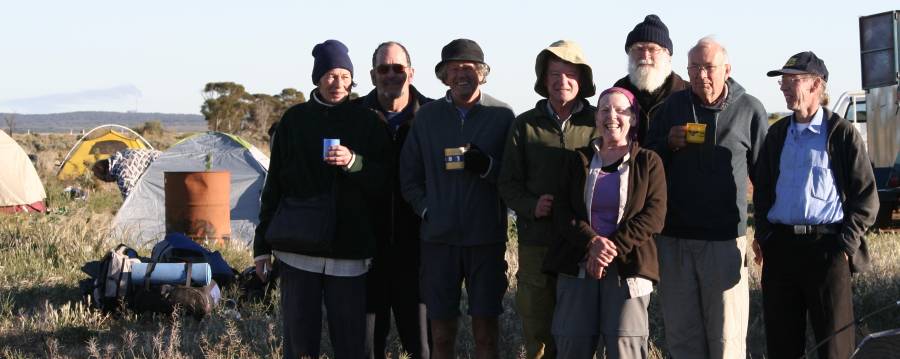
|
From left to right: Margaret Hender (of
CORENA), Pete Gorton, John Bowman,
Marty O'Hare, Gaby Jung, Me (Dave Clarke), Bill Gresham, Les Webb.
More than two years later I am still in touch with all of them.
Note the smoke plume from the Port Augusta coal-fired power station on the
left.
|
|
The walkers came from all over Australia. There seemed about as many from NSW or Victoria as there were from SA. Others came from WA, Queensland and Tasmania.
How did I handle the walk? (By the way, I was the oldest by about six months.) The first day was only 16km, while the average day was around 23km. I walked the first day with no problems. On the next three days I drove a support car (I was one of the few to have my own car and trailer on the walk) about half the day and walked half the day. From then on I walked all day every day. Raised a couple of blisters on about the ninth day, but apart from that had no problems. Many of the younger people had big problems with blisters and had to take days off.
We met (State) Minister (Energy and Infrastructure?) Tom Coutsantonus on the road. He was very positive about agreeing with our aims, but said that a solar power station at Port Augusta was too big a project for the State Government; money would have to come from the Federal government. (At least up to 2024 no solar thermal power station has been built in South Australia.)
There was a lot of media coverage before, during and after the walk. Everyone in SA who had any interest in renewable energy, or in the Port Augusta area, would have heard about it. After two weeks we arrived in Adelaide and there was a rally that started in Rundle Park (Dr Karl Krusetnitski as the main speaker), from there to the steps of Parliament House, then on to Victoria Square. Again, a big media presence.
All in all, it was a wonderful experience, and it showed me that I am not
alone in caring about the world!
The second long walk
|
|
|
A fortunate life
|
- I was born into a loving family and my parents were intelligent and reasonably well off financially;
- I was born at a time when science and free thought had largely displaced superstition and religious dogmatism;
- I was born in one of the more economically progressive, and least religious countries in the world (Australia);
- I was born in a progressive and wealthy age;
- I was born before the great concentration of wealth into the hands of a few had corrupted the government of many nations, including my own;
- I was born before Mankind's impact on the world had caused the enormous harm that we are facing now;
- I had the good fortune to learn to question everything – to take nothing at face value. I don't think I can really take credit for this – it just happened;
- I have a wonderful family;
- While I have never been wealthy, neither have I ever been poor; I've always had enough income to cover my – and my family's – needs, with enough left over for a few luxuries such as an occasional dinner out and an annual holiday;
- I have never been a sheep – never cared much about following fashion, always sought to develop my own 'philosophy';
- I have been lucky enough to not become an alcoholic, not take up smoking and to have quite good general health.
|
|
Elysium
Early morning mist, winter, Elysium
|
|---|
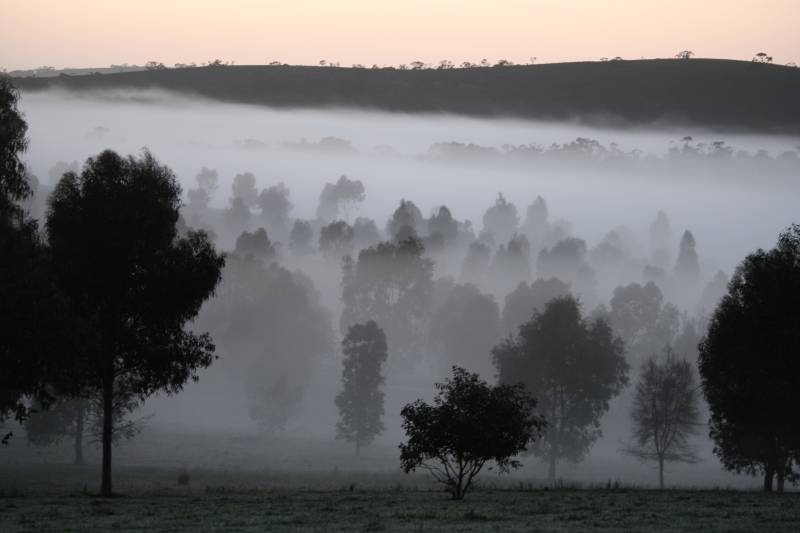
|
Some of the trees we have planted at Elysium |
The family property, 'Elysium', in the Clare Valley of 'Mid North' South Australia has a total area of 46ha. We bought it in 1993, when, apart from a small pine forest, it had on it about 50 gum trees and nothing else of note.
It now includes 2ha of shiraz wine-grape vines, about 5ha of olive trees, several plantations of closely spaced eucalypt hardwood trees, and a number of fruit and nut trees. Most of the remainder is now covered with open woodland that I have planted; there would have to be over a thousand gums in total. When these trees mature they will begin to be sustainably harvested for firewood. In 2012 I have noticed for the first time that there is quite a lot of natural propagation of 'my trees' happening. The area beneath and between the trees will be available for grazing animals.
There are several photos of Elysium elsewhere on this site. Clare trees is a page I have written detailing my efforts at tree growing on Elysium.
Tyres floating on my dam to reduce evaporation
|
|---|
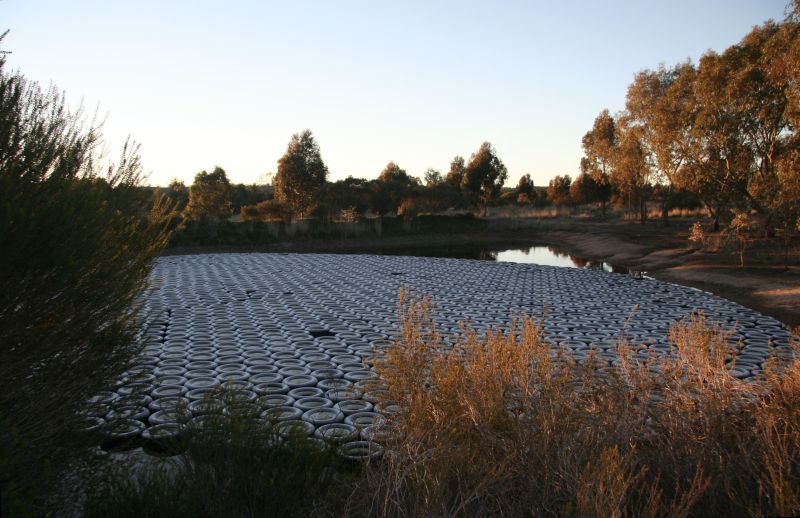
|
Reducing evaporation from farm dams in hot dry areas such as the Clare Valley is an important issue. This photo was taken on a frosty morning in July 2012 before the dam filled. |
|
|
We sold Elysium, in two parts, over a few years up to 2022 due to increasing age and an inability to look after it adequately.
The environment and me
|
My approach to the environment
First I should say that I owe more than I can ever repay to my wife, Denece, for her never ending support and help.Climate change and related problems are the greatest disasters humanity has ever faced. Most Australians seem not to care enough to change their greenhouse gas producing habits. I must admit that in the past I have been content to do more about reducing CO2 emissions than most other people; partly due to Monbiot's statement mentioned above I have come to believe that being a little more responsible than most is not enough, one should do as much as one can.
I would like the Earth of the future to be not greatly inferior to the one that I know and love.
The list below I compiled partly because I wanted to make a list for my
own interest, and partly in the hope that it might give others some ideas
that they may not have already thought of.
| ||
| ||
| ||
| ||
| ||
| ||
|
My efforts to become more environmentally responsible
I have listed many actions that governments, industry, and individuals can take to limit their greenhouse impact in my page on What should be done? Of course I try to follow my own suggestions.- Trees
Trees take carbon dioxide from the atmosphere.- Trees on roadsides With help from family and friends, I have planted trees on all available roadsides within several kilometres of my home. (Photo at right)
- Open woodland I am planting trees on the family property, ' Elysium'
- Controlling feral plants I have killed most of the feral pepper trees along the creek at Bowman Park and some other areas around Crystal Brook to allow native trees to recover. I have cleared feral pine trees on part of Blyth Road and the Riesling Trail in Clare.
- Cellar I had a cellar built at Elysium in July 2006. This used a large amount of concrete which is not environmentally friendly, but the energy savings in the long term, due to there being no need to heat or cool the cellar, will outweigh the initial environmental cost.
- Transport
There are a number of things that can be done to minimise ones greenhouse impact.- Minimise car use I try to only use a car when there is no reasonable alternative and walk or ride a bicycle when I can.
- Use a small car rather than a big car Use a trailer when the car is not big enough. (Photo at right)
- Use public transport When walking or cycling is impractical and when available. (There is very little public transport in my area.)
- Avoid flying Not one of my strong points!
- Electricity
- We used to buy our electricity from AGL, but since they, like the other two big electricity retailers (Energy Australia and Origin), lobby the government against renewables, we changed to Diamond Energy;
- I try to be conscious of minimising our use of electricity all the time.
- Solar water heater We have had a solar water heater on our house for about 30 years, and have more recently installed one at Elysium. They have not only saved lots of carbon dioxide, but have saved us a bucket of money. (Photos at right)
- Solar photovoltaics We installed 1 kW of panels at our home on 2006/02/08 (either the second or third PV in Crystal Brook, photo at right), another 1.5 kW at Elysium on 2011/01/18, paid for 5 kW more to be installed on our daughter's house on 2011/01/25, paid for about 3.4 kW on our son's flat in April 2011, and put another 5.2 kW on Elysium on 2014/02/18 (a total of 16 kW). In March 2021 I had another 5.94kW installed at Crystal Brook making the grand total 22kW.
- Green electricity We buy 100% green electricity.
- Heating/cooling
- Wood fire heating We rarely use any other form of space heating.
- Evaporative air conditioning We only use the more energy consuming heat-pump (reverse cycle) air conditioning at the rare times when it is hot and the humidity is too high for the evaporative air conditioning to work.
- Use natural heating/cooling We try to minimise the need for home heating and cooling by using passive methods of temperature control, such as insulation and opening and closing windows at appropriate times. In winter we open the house at the warmest time of day; in summer we open the house in the coolest time of day.
- Rain water We catch most of the rain that falls on our roof. This saves a little water from the over-taxed Murray river.
- An effort to change the World
A citizen's participation in democracy should not be limited to voting.
I have heard advice that there is no use
worrying yourself over things that you cannot change; this is good advice, but
it should not stop you from trying to change those things that are very
difficult to change. If you want something done, do it yourself. If you
try you may fail, if you do not try you will certainly achieve nothing.
If you are unwilling to try, why should others do so?
- Letters to newspapers
- Letters to politicians
- I have stood for parliament twice
- Maintaining this Internet site, which is largely devoted to environmental matters, particularly wind power
- Participating in a 320km walk from Port Augusta to Adelaide in support of a solar-thermal power station at Port Augusta
- Participating in a 740km walk from Melbourne to Canberra to press for action on climate change from our federal government
- Ethical investments We are careful to place our savings where they will be used ethically. For example, we took most of our cash savings from the ANZ bank, because it was loaning money to coal miners, and placed them with the People's Choice Credit Union.
- Cleanup I am trying to get the message out about climate change at the same time as cleaning up local roadsides.
- Refrigerator/freezer A minor thing, but everything counts – we replaced an old refrigerator and freezer with modern and more energy-efficient ones. Not only has this reduced our greenhouse footprint, but it will save us money in the long term.
Total energy consumption
Peter Seligman, in his book "Australian Sustainable Energy – by the numbers" gives total energy use in Australia as 200 kWh per person per day. Of this 42% is electricity (84 kWh/p/d).My wife and I use a total of about 12 kWh/day electricity (three meters, figures for 2010); this is 100% green power so would equate to about 13 kWh/day at the generators (wind or hydro) allowing for transmission losses. (If we used fossil fuel generated power then the total energy in the fossil fuels burned to supply our 12 kWh/day would be about 53 kWh/day (12 × 1.1 / 0.25, allowing for transmission losses of 10% and conversion efficiency of 25%).
|
|
CO2 production calculation
I have used my Greenhouse impact calculator to calculate how much CO2 I expect my wife and I to be responsible for releasing into the atmosphere in 2006. This section was written in February 2006 and updated in August 2006.I recommend this exercise to everyone. I learned a lot from doing it. (Most of the figures are at least to some extent estimates; of course now [December 2012] they are dated.)
| 2006 | |||
|---|---|---|---|
| Activity | kg CO2 | kg totals | |
| Holiday in Vietnam | Air travel | 4600 | |
| Internal travel | 1000 | Vietnam total 5600 | |
| Holiday in Western Australia | Air travel | 840 | |
| Car travel | 720 | WA total 1560 | |
| Use of cars | Toyota Corona | 500 | |
| Mazda 121 | 1800 | Vehicles total 2300 | |
| Electricity consumption 100% green electricity | At home | 0 | |
| At Elysium | 0 | Elec. total 0 | |
| Building concrete cellar | Cement | 4500 | |
| Steel | 1000 | Cellar total 5500 | |
| Miscellaneous | (Guess) | 500 | 500 |
| Gross total | 15,460 | ||
| Electricity abatement | Photovoltaic panels | 240 | Abatement credit total 240 |
| Net total | 15,220 | = 15.22 tonnes | |
|
|
| 2007 | |||
|---|---|---|---|
| Activity | kg CO2 | kg totals | |
| Use of cars | Honda Jazz | 1800 | |
| Mazda 121 | 600 | Vehicles total 2400 | |
| Electricity consumption 100% green electricity | At home | 0 | |
| At Elysium | 0 | Elec. consumption total 0 | |
| Miscellaneous | (Guess) | 500 | 500 |
| Gross total | 2,900 | ||
| Renewable electricity credits | Photovoltaic panels | 240 | 240 |
| Net total | 2,660 | = 2.66 tonnes | |
|
| 2020 | |||
|---|---|---|---|
| Activity | kg CO2 | kg totals | |
| Holiday in Western Australia | Air travel | 1,950 | |
| Other travel | 100 | WA total 2,050 | |
| Use of cars | Honda Jazz | 2060 | |
| Mazda 121 | 700 | Vehicles total 2760 | |
| Electricity consumption 100% green | At home, 1440kWh | 0 | |
| At Elysium, 1807kWh | 0 | Elec. total 0 | |
| Miscellaneous | (Guess) | 500 | 500 |
| Gross total | 5,310 | ||
| Electricity abatement | Elysium, 9,052kWh | 4,526 | |
| Crystal Brook, 479kWh | 240 | Abatement credit total 4,766 | |
| Net total | 544 | = 0.544 tonnes | |
These tables show how much impact holidays involving air travel have on one's greenhouse gas production. The holiday in Vietnam for two people, at 5600kg of CO2, was 36% of our gross greenhouse gas production for 2006, the holiday in WA was 39% of our gross for 2020.
| |||||||||||||||||
I have only considered the CO2 that my wife and I are directly responsible for here. The abatement for the trees that we have grown is calculated elsewhere on this page.
|
|
CO2 abatement calculation
I have used my Greenhouse impact calculator to calculate the abatement from the tree plantings on our family property, Elysium. This calculation was done in February 2006.
| Plantation | No. trees | Ave. mass | Annual % increase | kg CO2 |
|---|---|---|---|---|
| Bore | 150 | 100 | 40 | 5500 |
| One Hectare | 600 | 40 | 40 | 8800 |
| Bog | 100 | 60 | 40 | 2200 |
| Dam paddock | 150 | 5 | 200 | 1375 |
| 25 | 300 | 40 | 2750 | |
| New paddock | 300 | 1 | 250 | 690 |
| Open Woodland | 400 | 1 | 250 | 920 |
| 80 | 300 | 40 | 8800 | |
| Totals | 1805 | 31 035 |
Notes on the table
I have calculated that the native eucalypts that I have planted increase in mass by about 200% per year from the end of the first year to about year 5, then increase by about 100% per year to year 10. Where I have used the relatively low 40% annual increase rate the trees are close enough together to compete fairly heavily. These figures are obviously approximations.These calculation do not include trees and shrubs that I have planted on roadsides; nor the feral pepper trees that I have killed (they will release CO2 to the atmosphere as they rot, but then they will eventually be replaced by native trees).
The CO2 absorbed by the 'Open Woodland' planting will increase quickly as more
trees are planted and their average mass increases. These trees are spread
over about 35ha.
What I have learned out of this exercise
It has surprised me that the 1800 trees I have planted at Elysium are probably only taking twice as much CO2 from the atmosphere as my wife and I will be putting into the atmosphere in 2006. A lot of land, time and expense has been devoted to these trees. This shows how hard it can be to balance one's greenhouse gas impact and convinces me more than ever that our society should be taking greenhouse/climate change much more seriously.Buying 'green electricity'
I have also been surprised at how much my personal greenhouse impact was reduced by subscribing to green electricity. Buying 630 kWh of electricity (at Elysium, from AGL) at 5.5c/hWh, a total of $34.65, reduces my annual CO2 production by 700kg. This would have to be by far the cheapest reduction that I have managed.|
|
Influences
Positive influences
|
- My parents
- My father and mother instilled in me a basic feel for justice, good,
decency, honesty, etc.
My mother tried to make me religious (Methodist), it didn't work; but
my parents tempered their religion with ethics.
I was fortunate in having parents who always, at least so it seems to me
now, considered my interests and needs at least on a par with their own.
- My wife Denece, my son Ken, and daughter Julia
- I owe Denece more than I can say.
Ken is one of the few people I feel I can argue a moral, scientific or
philosophical issue with.
Julia helps to keep me in touch with some big sections of society and ways
of thinking that I might otherwise neglect.
- Socrates, Plato, the ancient Greek philosophers in general
- The first recorded reasoned thoughts about ethics.
Every thinking person in the West is influenced by these people, I was
especially impressed by an early reading of Plato's Republic.
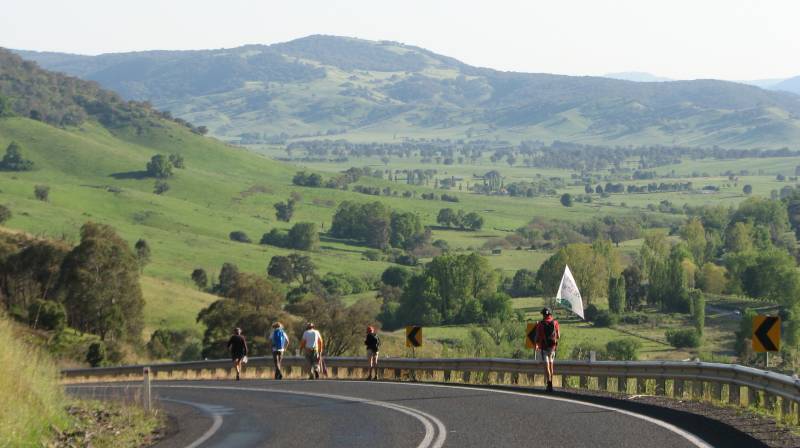
Down the last big hill on the Tumbarumba road to Tumut
Melbourne to Canberra walk - Walking companions
- I walked from Port Augusta to Adelaide in support of solar thermal power
in 2012 and from Melbourne to Canberra for climate change action in 2014.
The wonderfull people with whom I walked have all influenced me; several
have remained good friends.
(I don't want to list any here because I don't know where I should stop on
the list.)
- Ian Roberts and Des Menz
- Two Clare locals who are inspirational in their environmental and
social efforts.
- Sandy Dodds
- A friend with whom I have had many interesting discussions on ethics,
general philosophy, science, government, and other subjects.
- Zac Sibenaler, Don Armstrong, Bob Read and Mike Cobb
- I was privileged to work with these honest, intelligent, ethical and
kind men.
At one time or another they were all my bosses.
They didn't go very high in the public service because they held honesty
and loyalty
to the people below them more important than sycophancy and ambition.
- Bertrand Russell
- Mainly through his book, A history of Western philosophy, but also
though humanitarianism and his example in pacifism.
- Gandhi, Mohandas Karamchand (Mahatma 'Great-Souled')
- Through his example, his 'civil disobedience' and peaceful protest,
his way of achieving great things without hurting anyone.
If only politicians tried to follow Gandhi's example in getting things
changed without blood-shed.
- Peter Singer
- Through his books: Animal rights, How ethical is Australia, How are we to
live?, One World: the ethics of globalisation, Practical Ethics, The Most
Good You Can Do.
- The Dalia Lama, Bstan-'dzin-rgya-mtsho
- Through his book, The Art of Happiness. He seems to have thoroughly
developed the Buddhist art of dispassionate analysis of life.
- Paul Robeson
- Through his long and courageous stand for civil rights for his people
and for what he believed to be right and his use of patient, peaceful protest.
- Jesus
- He had some great ideas. Anyone raised as a Christian in a predominantly Christian country cannot help being influenced by Jesus.
Christianity and its successor, Islam, were largely disasters; they stopped people from thinking clearly and freely and they lead to many wars and enormous cruelty and injustice, but Jesus should not be held responsible for this.
- Saint Francis of Assisi
- For his early (for the West) realisation that other animals are our brothers
- The great early scientists, and science in general
- Too many to name; where would we be without them, and it? Some are named in Milestones.
They had a lot to do with saving us from the dictatorship of monolithic Christianity.
- Charles Darwin
- By explaining organic evolution so well that no reasonable person could doubt its truth he helped to free the world from the God delusion.
(God was no longer needed to explain the complexities of life on earth.) Alfred Russel Wallace also explained organic evolution; his work and Darwin's were presented together to the Linnaean Society of London on 1858/07/01.
I've read Darwin's On the Origin of Species and a book on Wallace titled The Malay Archipelago.
- Siddhartha Gautama (Buddha, Buddhism)
- Like all the great religions, Buddhism includes a lot that is nonsensical,
however there is a lot that is admirable in Buddhism.
- Terry Lane
- An exceptionally insightful, well informed, and intelligent
ABC radio interviewer; now retired
- George Monbiot
- A journalist dedicated to honesty, truth and a future for the Earth.
Writes for the UK Bulletin and keeps an excellent Internet site.
- Jonathan Neale
- Through his expose in A People's History of the Vietnam War; one of the great crimes against humanity of recent years.
|
|
Negative influences
- Religion
- I was brought up a Methodist Protestant Christian. I gradually became aware that there was absolutely no evidence for the existence of a God (or gods). From there I went on to realise that religion had resulted in huge injustices, cruelties and delays in the progress of society.
Religion is delusional and delusions are a fault that we cannot afford in the twenty-first century when there are so many threats to our shared planet.
- Hitler, Stalin, George Walker Bush, John Winston Howard, Anthony John "Tony" Abbott, Scott Morrison, Vladimir Putin and Xi Jinping.
- Twisted men who believed that power and wealth are sufficient for greatness, that war can be good, that governments can limit the freedom of speech and the press when they choose, that people can be locked up indefinitely without trial if that is convenient, that immoral means can be justified by the end (which may never be achieved), and that the only value the environment has is the wealth that can be got from it.
They were (or are) willing to damage the world and trample people's rights for what they saw as the short term 'good' of their class or supporters, or for their own glory.
- (Doctor) Sarah Laurie
- Sarah Laurie was for a time the general practitioner I consulted in the small town that we both lived in, Crystal Brook. After she left general practice she became convinced that wind turbines made people sick. She searched for 'evidence' connecting wind turbines with illness and apparently believed whatever she could find. It seems that she chose not to question what she found.
At the same time I was supporting wind power (and other renewable energy technologies) because of the undeniable connection between the burning of fossil fuels and anthropogenic climate change.
Ms Laurie very successfully spread her delusional belief to anyone who would listen in the period from about 2010 to 2014. Since then, of course, the nonsense has gone into the dustbin of history. Ms Laurie's delusion-based campaign was a personal lesson to me on how someone can go badly wrong by looking only at the 'evidence' that supports one's beliefs and do great harm by conscientiously following a false belief.
|
|
|
Information sources
While much of my information comes from the books I've read, the people I've listed as positive influences and the Internet generally, there are a few specific sources that I've found to be particularly reliable and important:- The ABC (Australian Broadcasting Commission);
- Google News Alerts (although since at least mid 2021 I've been disappointed with Google search; it misses a lot; Yandex seems better);
- The Guardian;
- Open NEM to keep track of
- Renew Economy; progress toward 100% renewable energy;
- the Sydney Morning Herald;
- The Conversation;
- Wikipedia.
My affiliations
I write these pages with a completely free hand. I am not beholden to any company, lobby group, political party or government; however as of August 2011 I did have the following affiliations:- Life member Trees For Life, South Australia;
- I have financially supported the Australian Greens and was for many years a member of the Australian Democrats;
- I have given donations to, and continue to support, various environmental conservation groups as well as general charities;
- I am a supporter of 'Death with dignity';
- I have sold limited rights to some photos, including to wind farm operators;
|
|
Books
Some other of the books that have influenced my way of thinking are noted above under Influences; others are below - in no particular order...
- A Field Guide to Rocks and Minerals (1960)
- Frederick H. Pough; I believe that this was the first book I bought on mineralogy/geology. To some extent it would have helped ignite my interest in the subject that was to become a big part of my life.
- Fortunes in Minerals
- Ion L. Idriess (1889-1979); this was another early book I read on mineralogy. (I read many of Idriess's books. In my opinion he was an outstanding author on Australia in the period of his lifetime.)
- Mineralogy: An Introduction to the Study of Minerals and Crystals
- Kraus, Hunt and Ramsdell; from which I learned much about mineralogy and, in particular, qualitative chemical analysis (at my home).
- Larousse Encyclopaedia of Astronomy
- Probably about 1960 edition. I learned a lot from this book. Astronomy has moved on to the point of almost being unrecognisable since then.
- The Challenge of Things: Thinking Through Troubled Times
- A. C. Grayling. I was struck by how much Anthony Grayling and I had in common in the things we thought about and wrote about, and how much our opinions and concerns aligned - also by how far greater and deeper his knowledge of his subjects was than mine.
- Ethics in Practice: An Anthology
- Edited by Hugh LaFollette, Blackwell Philosophy Anthologies
- Hiroshima Nagasaki: The Real Story of the Atomic Bombings and Their Aftermath
- Paul Ham. Giving a detailed background of the events that led up to the atomic bombing of Japan. It holds that it was not the nuclear bombing of the two cities that ended WW2.
- His Dark Materials
- A trilogy novel written by Philip Pullman: apart from being a very good read, it gives a fascinating and novel interpretation of the Judaeo-Christian mythology.
It is the only story I've ever come across that explored the possibilities in the concept of the overthrowing of God.
Published by Scholastic Children's Books.
(Had it been written about Islam rather than Judaeo-Christianity it would probably have resulted in the burning of embassies.)
- The Prince
- Niccolo Machiavelli explored the possibility of divorcing
politics from ethics; John Howard and Kevin Rudd could have taught Machiavelli a thing or two.
- Principles of Physical Geology
- Arthur Holmes; I bought this book out of interest and later found that it was required reading in a summer school in geology I attended at the University of Tasmania in about 1971.
- The Coming Famine: The global food crisis and what we can do to avoid it
- Julian Cribb; One of the aspects of the end of the current civilisation is the unsustainability of present farming methods and the increasing demand for higher quality food.
- Philosophy (Beginners Guides)
- Peter Cave; Forces questioning of most of the things that one thinks one knows
Danang kids 
How many kids like these were killed in the Vietnam War? - Memoirs of War: The Central Highlands
- Le Cao Dai; A North Vietnamese Journal of Life on the Ho Chi Minh Trail 1965 – 1973; which I would highly recommend to anyone wanting a glimpse into the Vietnam War from 'the other side'.
- Guns, Germs and Steel, and Collapse
- Jared Diamond; every thinking person should read Collapse because of its applicability to the present times.
- A People's History of the United States
- Howard Zinn An alternative, and I suspect, a much more honest and human history of the USA; highly recommended
- The God Delusion, The Blind Watchmaker and The Greatest Show on Earth
- Richard Dawkins
- God is not Great: How Religion Poisons Everything
- Christoper Hitchens
- In the Footsteps of Gandhi
- Catherine Ingram; discusses a number of people who have adopted Gandhi's methods of non-violence to bring about change
- Meditations
- Marcus Aurelius; His Meditations make him sound like a man who I could easily have liked and respected.
|
|
Revegetation
About 1988 I started planting native trees along roadsides around my home town, Crystal Brook.Crystal Brook area
| ||
|
Other roads planted were Nurom Road between the creek and highway, Frith Road, Darbon Terrace, (and the apparently unnamed road on the western side of town that run between Greig Road and Darbon Darbon Terrace), parts of Huddleston Road east of the cemetery, Bowman Park Road, Gadd Avenue south-west of town, and Brook Park Lane.
In the first year I planted Australian native trees that were mainly endemic to Western Australia (along the south-western side of Greig Road); after that I only planted species that were endemic to the local area.
In mid 2019 I started revegetating Crystal Brook's Central Park. I've written a little more on this elsewhere on this page.
Feral pepper trees
Starting about 2002 I began trying to remove feral pepper trees along the Crystal Brook. At first I cut and swabbed trees upstream of Lions Park, not very successfully. Someone else later did more work on these trees.In August 2003 I started killing pepper trees along the Crystal Brook at Bowman Park. I kept the local council (Port Pirie Regional Council) fully informed of what I was doing. To say the least, Council has not been supportive, although they have agreed that the pepper trees should be removed. I have discussed this in my jottings page. I intend to continue this project until all the pepper trees along the creek in Bowman Park are dead.
When the pepper trees are gone the native red gums (Eucalyptus camaldulensis) will be able to take their place. Many red gums along the Crystal Brook have suffered greatly from a lack of water in recent years. Killing the pepper trees will make many thousands of litres of groundwater available to the gum trees each year.
The method I have used to kill the pepper trees is drilling and
injecting
with Garlon. This is done by drilling 6mm diameter holes at least to the
cambium layer at about 5cm spacing around the trunk of the tree and then
immediately filling the holes with neat Garlon. The holes should slope
downward and should be as close to the base of the tree as possible.
I have been informed that glyphosate is just as effective as Garlon, but
have not yet tested this.
Clare area
|
In early 2005 I got permission from the Clare and Gilbert Valleys Council to begin removing feral trees and revegetating with natives along a length of the Clare to Blyth road. The section I am working on runs from the top of the hill overlooking Blyth (Lat. S33.84039, Long. E138.55978) about a kilometre down the hill (to Lat. S33.83981, Long. E138.54965).
Blyth Road east of this point is crowded with ferrel trees, mainly aleppo pines, but also olive trees and others; there is very little native roadside vegetation remaining between Scobie Road and the top of the hill. There is a lot of native vegetation remaining along the section that I'm working on, but there is also many ferrels: mainly aleppo pines, olives and briars.
As of April 2006 I have killed most of the aleppo pines. They are easy to kill. The smallest are easiest handled by pulling them out, larger ones can be cut off at ground level, and the biggest can be ring-barked.
|
|
Gleeson Wetlands
| A small part of the Gleeson Wetlands |
|---|
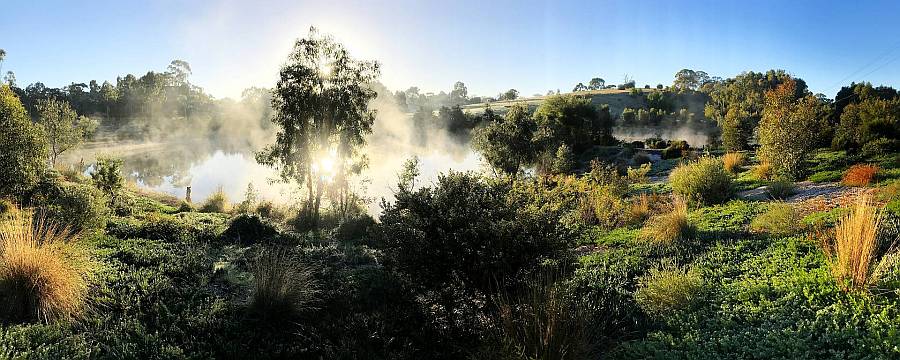
|
Starting in June 2014 the Clare Lions Club took part responsibility for looking after the Gleeson Wetlands. I have spent many hours, and obtained great satisfaction, working at killing weeds, planting, mulching and generally looking after the gardens at the Wetlands.
|
|
|
A purpose
|
Yet it seems to be human nature to crave a purpose, so what purpose can one give to one's life? Apart from the day-to-day necessities of living, can we feel that we have some value? How can we have any self-respect if we see our existence as useless and pointless?
In the first few decades of our lives we are occupied with our education, finding our place in life, and probably finding a partner. Once we have children (supposing we are among those who do have children) we have a purpose in giving them the best possible start in life that we can. (Abraham Maslow produced a hierarchy of needs, which is very relevant to this subject, but too complicated for me to go into on this page.)
But when our children have left home and become independent, and supposing that we are sufficiently financially secure that our immediate needs are taken care of, what purpose remains to life?
My musings on ethics and compassion have convinced me that I can and should make an effort to do what little I can to make the world a better place in my remaining years. This led to my page on contribution. (I have written at some length about my general background elsewhere on this page.)
I am convinced that climate change and the related problems of ocean acidification, sea level rise, ocean warming and the air pollution from the burning of fossil fuels that kills millions of people world wide each year are the greatest threats facing our shared world. I also believe that humanity could greatly reduce the harm that we are doing to the planet with relatively little effort. Yet we are not making that required effort, and the Earth continues to suffer from our misuse. So I feel that my primary purpose at this point of my life (2017) is to do what I can to try to get action on greenhouse emissions. At the same time I will do what I can to try to improve my local environment.
It happens that the region in which I live is well suited for wind farms, which reduce greenhouse emissions by displacing fossil fuel generated electricity. Some of the local wind farms that are present have been built with little or no opposition, others have had determined and vocal opposition. Many of the arguments put forward by the opponents are ill-informed, dishonest and misleading while some of the fears are so out of touch with reality as to justifiably be called delusional. No one else in my region, apart for those who are building the wind farms, have made much effort to try to counter the misinformation from the wind farm opponents, so I have found a purpose in doing so myself as an independent voice. On other pages on this site I have written about wind power in Australia, have discussed why I support a proposed local wind farm which is suffering from selfish, short-sighted opposition and mused on the contrast between the opposition movements to wind and to coal.
I have largely concentrated on the problems relating to climate change; one can't do everything, one must choose one's battles, but I try not to loose sight of the great many other problems and injustices that we see all around us.
Apart from action on climate change, up to when Denece and I moved to Western Australia in February 2022, much of my spare time has been put into improving Gleeson Wetlands in Clare, Crystal Brook's Bowman Park and Central Park and cleaning up rubbish on roadsides.
After our move to WA in February 2022 what I would think of as my productive time was spent on removing weeds from public areas, picking up rubbish, and writing these pages. I have continued to write letters to newspapers and politicians, financially support good causes, and encourage local councils to do the things it seems to me that most need to be done. I've written a short summary of my other activities in WA on the same page as the weed controlling.
|
|
The best thing I've done?
It is obvious to all but the intentionally blind and the grossly ignorant that climate change and related issues are the greatest threat facing the future of our shared environment. The development of wind power in SA was important in reducing the greenhouse emissions that drive climate change.I believe that I had a significant part in informing the public of the truth in pages such as Wind health, Wind turbines save lives and many others. I've also exposed those who have blatantly lied about wind power, such as individuals including a number of politicians, Connie Bonaros for one, and groups like Stop These Things.
The lies about wind power continue in 2024 with people like Andrew Hastie, federal member of parliament for Canning, where I was living at the time.
